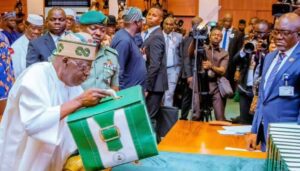
Inflation rate: Mixed reactions as CBN again raises MPR, CRR
…Decision poses negative impact on equities — Security experts
…Wrongly timed, won’t tame inflation, will rather hurt investors, businesses — CPPE
…Rate hike will cut down borrowing, address rising liquidity — Chizea
By Seun Ibiyemi and Ariemu Ogaga
Again the Central Bank of Nigeria (CBN) increased the benchmark of Monetary Policy Rate (MPR), also known as interest rate, from 14 per cent to 15.5 per cent as a way of tackling inflation.
The increase, disclosed on Tuesday, forms the third hawkish move by the apex bank in 2022.
The latest move by the MPC is the highest in 20 years.
The committee had increased the MPR by a total of 250 basis points at its last two meetings.
The MPR is the baseline interest rate in an economy; every other interest rate used within the economy is built on it.
CBN Governor, Mr Godwin Emefiele, announced the new rate after the September bi-monthly MPC meeting in Abuja.
The MPC also raised Cash Reserve Ratio to 32.5 per cent from 27.5 per cent while holding other parameters constant.
The Asymmetric Corridor, thus, remains at +100/-700 basis points around the MPR, and the Liquidity Ratio remains at 30 per cent.
Asymmetric interest rate corridor is a new tool developed to increase the flexibility of monetary policy.
It provides the ability to make timely responses to external finance or risk sentiment shocks through active management of daily open market operations.
“The MPC noted with concern the continued aggressive movement in inflation, even after the rate hike at its meeting in May and July.
“It expressed its unrelenting resolve to restore price stability while providing the necessary support to strengthen the fragile recovery,” Emefiele said
…Decision won’t tame inflation rather will hurt investors, businesses — CPPE
Reacting to the development, in a chat with Nigerian NewsDirect on Tuesday, the Chief Executive Officer (CEO), Centre for the Promotion of Private Enterprise (CPPE), Dr Muda Yusuf, said CBN’s decision will not tame inflation, rather it will hurt investors and businesses because commercial banks will have their loans/debts reviewed.
He added that this is not the best time for CBN to review interest rates upward.
Muda advised government to consider reviewing its foreign exchange policy, address insecurity, energy cost and others as viable solutions to Nigeria’s economic quagmire.
According to him, “What I feel is that the decision of CBN is going to hurt many investors indebted to banks, because banks are going to review their interest rate. This is not the best time considering the foreign rate, energy cost and other challenges businesses are facing, especially as this will not tame inflation.
“We saw interest rate increase in past months, it didn’t change anything. The inflation in Nigeria has continue to increase,” he said.
He submitted that, “The solution is for Government to look at factors of foreign exchange policy, insecurity, financing fiscal deficit and energy cost,” not interest rate.
He noted that the Nigeria foreign exchange policy is creating more harm to the Naira.
“The only advantage of this decision is that Money market returns will improve, fixed income market also, but the stock market will be penalised,” he stated.
Rate hike will cut down borrowing, address rising liquidity — Chizea
On his part, the Managing Director and Chief Executive Officer, BIC Consultancy Services, Dr. Boniface Chizea said the interest rate hike will cut down borrowing, address rising liquidity within Nigeria’s economy.
According to him, “There is concern with regard to the rate hike because at the end of the day interest rates are factor costs which add to the cost of production which the economic agent based price/elasticities of demand will try to recoup which will amount to an addition on to the price of goods and services in the economy. It is reflection of the seriousness of the situation for an unusual increase of up to 150 basis points to have been made.
“The monetary authorities have no option but to jack up interest rates in an effort to control inflationary pressures. That is the wisdom with monetary authorities across the globe as it is currently being witnessed.
“Unfortunately, the authorities don’t have many options in terms of policy response against the background of inflationary pressures.
“But what to take on board here is that hiking up interest rates is a perfect response for a situation of rising liquidity within the economy.
“What it does is to make borrowing more costly so as to discourage outlying/ marginal borrowers. The calculation is that such a development will eventually reduce money supply in the economy.
“But there are inflationary situations whereby the cause of rising and galloping inflation is not due to excess liquidity. It could simply be due to rising factor costs which impacts price levels as economic agents attempt to pass on such increased costs of production.
“In the particular of Nigeria’s situation, the rate of exchange is known to be a main factor that impacts rising levels of products and services in the economy.
“But it is correct to observe that there is no economy anywhere that today does not have the problem of excessive liquidity as most economies embarked on quantitative easing to jump start productivity as a consequential result of the pandemic which shut down most, if not all, economies in the world.
“Unfortunately, as we were beginning to adjust to the end of the pandemic gearing up to resume growth and hopefully development, the Russia/Ukraine war happened on us and has gone for longer than most pundits predicted.
“In fact as things are today, the country that will have an upper hand and when and how the war will end, is anybody’s guess.
“In fact, out of frustration Vladimir Putin has warned that the threat of nuclear war is on the cards. Of course, the Americans have clearly warned him that any resort to nuclear weapon would mean that Russia will cease to exist. May we all be saved the far reaching; deadly consequences of a nuclear war.
“This war with sanctions in turn has now resulted in widespread scarcity of energy and grains resulting in spiralling inflationary pressures causing dire instability in most countries as inflationary pressure spiral out of hand, followed by weakening situation of rates of exchange.
“It is reported that the Pound Sterling is at its lowest in 40 years. As things stand now, only the American dollar; the world reserve currency is gaining unprecedented strength.
“We pray that good counsel would prevail and this war is brought to a quick end in the interest of much desired but elusive macroeconomic stability.
“We must realistically brace up for more of this hike in base interest rates as realistically the monetary authorities do not have an alternative way to manage the current situation of inflation rates spiralling out of hand,” he stated.
Decision poses negative impact on equities — Expert
In his view, the vice president of HIGHCAP Security Limited, David Adonri said that the interest rate hike by CBN is not surprising considering the continued rise in inflation.
“Unfortunately, two previous hikes did not reverse the rise in inflation rate,” he said.
“Perhaps the situation could have been worse if the tool was not deployed in those two occasions.
“However, studies show that interest rate hike in tackling inflation has not been very effective in the past in Nigeria.
“Studies also show that mop up of excess liquidity using open market strategy of debt sale by CBN had produced better result. Perhaps, MPC chose the interest rate management tool to tighten money supply because of the huge cost associated with a mop up operation.
“While tightening of monetary policy can ameliorate inflation, its negative impact on equities and production needs to be carefully weighed against the benefit.
“The programme may also not work if CBN is using one hand to tighten monetary policy and using the other to reflate the economy through Ways and Means advances to FGN,” he added.



